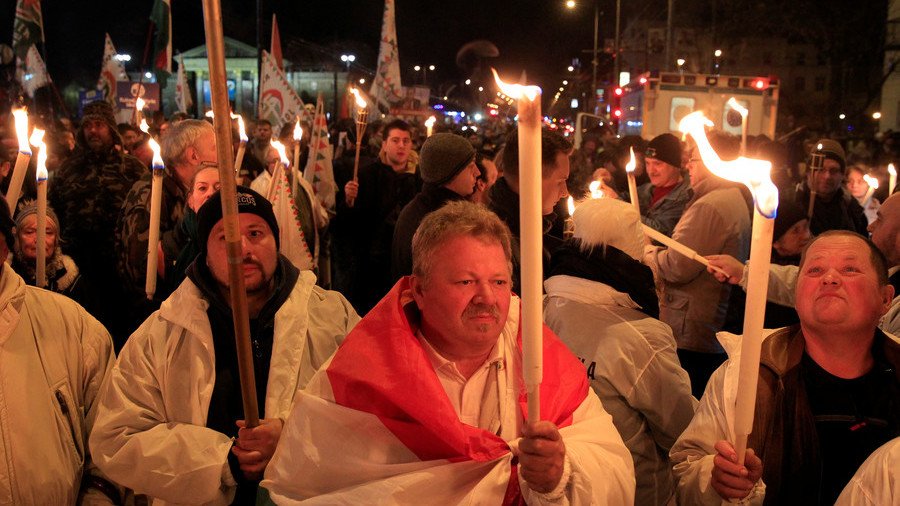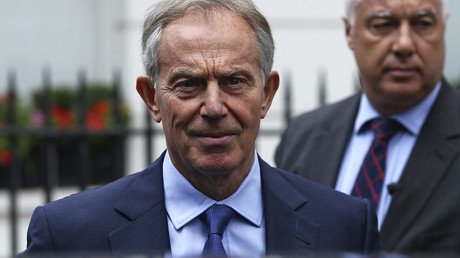Democracy in Europe threatened by surge of ‘populism,’ according to Tony Blair’s think tank

A surge of “populist” political parties threatens to destabilize democracy across Europe, according to Tony Blair’s think tank. However, its new report says nothing of the mainstream parties whose failures made this possible.
Former UK Prime Minister Tony Blair’s Institute for Global Change said populism could become the “new normal” in Europe and “transform public policy in radical ways.”
Defining populist parties as those from the left and right that “claim to represent the true will of a unified people against domestic elites, foreign migrants or ethnic, religious or sexual minorities,” the report says their number has almost doubled in Europe since 2000, from 33 to 63, and their average vote share in elections nearly trebled from 8.5 percent to 24.1 percent.
Over the same period, it said the number of European countries with populist parties participating in government has doubled from seven to 14 – creating an unprecedented “populist belt” from the Baltic to the Aegean.
Populist parties are the strongest in Eastern Europe and currently hold power in seven countries – Bosnia, Bulgaria, the Czech Republic, Hungary, Poland, Serbia, and Slovakia, the report says.
It highlighted British allies Poland and Hungary as run by parties that have begun to “dismantle key democratic institutions.”
According to the report: “Parties like Poland’s Law and Justice party and Hungary’s Fidesz tend to emphasize a nationalism based on soil, blood or culture; take a hard line against immigration; and have, especially in Poland and Hungary, quickly started to dismantle key democratic institutions like the free media and an independent judiciary. Working largely within the letter of the law, and drawing on widespread popular support, they have destroyed many of the institutions that are needed to safeguard democratic institutions over the long-run.”
In contrast to Eastern Europe, where most populist parties are on the right, those in Southern Europe are predominantly on the left, such as Syriza in Greece, and Podemos in Spain. The report said left-wing parties from other parts of Europe – including Labour in Britain – have embraced elements of populism.
In Western Europe, populist parties are less prominent and powerful than Eastern Europe, around 13% of the vote accrues to populist parties, a 4% increase compared to 2000. Renewing the Centre's report looks at the impact of populism in Europe #TBIPopulismhttps://t.co/ewTOGQznkg
— Tony Blair Institute (@InstituteGC) December 29, 2017
The think tank warned the trend looks set to continue unless mainstream political parties are able to find a way to counter the populists’ appeal. There are more and more instances of populist parties governing in coalition with larger parties, such as in Austria, where the right-wing populist Freedom Party has just become the junior partner in Sebastian Kurz’s new government.
As shown in the map, right-wing populist parties have historically been strong in Eastern Europe, while popular support for right populism grew during and after the refugee crisis in Western Europe. Read the full report here: #TBIPopulismhttps://t.co/ewTOGQznkgpic.twitter.com/SMVYPdjGWo
— Tony Blair Institute (@InstituteGC) December 29, 2017
One of the report’s authors, Yascha Mounk, a Harvard University lecturer and executive director at the institute, said the transformation of European politics was “long-term.” He said: “This populist wave has not crested and unless politicians manage to identify and counteract the structural drivers, populism will keep garnering strength in years to come.”
The report, however, lets mainstream political parties off the hook, despite them often being accused of creating the conditions necessary for populist parties to flourish, invariably as political alternatives to the mainstream ‘business as usual’ brand.
The anti-populism message positited by researchers associated with Blair is particularly problematic due to the former prime minister’s legacy of light-touch, free market economics, which exposed Britain to the global financial crisis that began as he left office. Meanwhile Blair’s decision to invade Iraq in 2003 destabilized the Middle East, creating the conditions that led to the emergence of the Islamic State (IS, formerly ISIS), exacerbating the terrorism threat and the refugee crisis.
With an almost religious attachment to the EU and its institutions, Blair pursued the 'ever closer union' with rare zeal, contributing to a backlash that would come in the form of Brexit.
Acolytes of Blair's ‘New Labour’, a pale imitation of the US Democratic Party, were soundly beaten twice by Jeremy Corbyn’s brand of socialism, eventually seeing the left-winger leading to the party to impressive general election results in 2017, despite criticism from his predecessor. Perhaps Blair's researchers should ask whether the mainstream parties are part of the problem and the populists, in fact, part of the solution.















